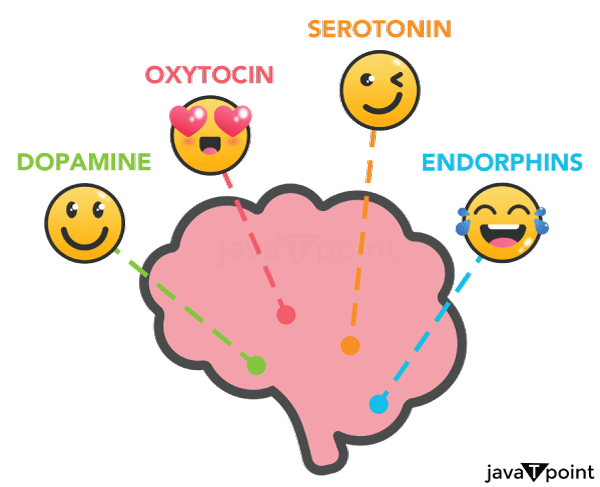Brain ChemicalsHuman body cannot function without chemical messengers called neurotransmitters. They are responsible for transporting chemical "messages" from one neuron (nerve cell) to the subsequent target cell. The following target cell may be a gland, muscle, or another nerve cell. 
The nervous system in the body is a huge network of nerve cells that communicate electrical impulses between nerve cells and the cells they are intended to target. Nervous system regulates the operation of the organs as well as everything from the intellect to the muscles. In other words, nerves play a role in everything think, feel, and do. Human nerve cells transmit and receive data from every part of human body. Body must constantly get feedback to operate at its best. What Body Functions do Nerves and Neurotransmitters Help Control?Nervous system oversees several bodily processes, including:
How do Neurotransmitters Work?In human body, there are many billions of nerve cells. Typically, there are three components to a nerve cell:
The axon terminal is a region of the neuron that contains neurotransmitters. They are kept inside synaptic vesicles, which have thin walls. Numerous thousands of neurotransmitter molecules can fit inside each vesicle. The electrical charge of a message or signal induces the neurotransmitter vesicles to fuse with the nerve cell membrane at the very edge of the cell as it moves along a nerve cell. The neurotransmitters are subsequently discharged from the axon terminal into the space between one nerve cell and the next target cell (another nerve cell, muscle cell, or gland), where they now deliver the message. Neurotransmitters transport the message through this region, known as the synaptic junction, which is less than 40 nanometres (nm) broad (for comparison, the width of a human hair is approximately 75,000 nm). Each type of neurotransmitter gives to a distinct receptor on the target cell, acting similarly to a key that can only fit and operate in the lock that it was designed to fit. After attaching, the neurotransmitter causes the target cell to undergo a change or act, such as sending an electrical signal to another nerve cell, contracting a muscle, or releasing hormones from a glandular cell. What Behaviour or Alteration do Neurotransmitters Convey to the Target Cell?Depending on the specific neurotransmitter, neurotransmitters can communicate one of three distinct actions in their messages.
What Transpires after Neurotransmitters Relay their Message?Neurotransmitters must remove their molecules from the synaptic cleft (the area between the nerve cell and the next target cell) after transmitting their message. There are three ways they accomplish this:
How many Different Types of Neurotransmitters are There?There are at least 100 neurotransmitters that are known to science, and many more may still be undiscovered. Based on their chemical makeup, they can be categorised into kinds. The following are some of the more well-known types, neurotransmitter examples, and their functions: Amino acids neurotransmittersMost of human nervous system's functions include these neurotransmitters.
Monoamines neurotransmittersThese neurotransmitters have a wide range of functions in human nervous system, particularly in the brain. Neurotransmitters called monoamines control consciousness, cognition, attention, and emotion. A lot of neurological conditions involve anomalies in monoamine neurotransmitters, and a lot of regularly used medications have an impact on these neurotransmitters.
Peptide neurotransmittersPeptides are polymers or chains of amino acids.
AcetylcholineThis excitatory neurotransmitter performs a variety of tasks in both the peripheral nervous system (nerves that branch from the CNS) and central nervous system (CNS [brain and spinal cord]). Most of the neurons in human autonomic nervous system, which controls the heart rate, blood pressure, and gastrointestinal motility, emit acetylcholine. Muscle contractions, memory, motivation, sexual desire, sleep, and learning are all influenced by acetylcholine. Acetylcholine levels that are out of balance have been related to health problems like Alzheimer's disease, seizures, and muscle spasms. What Causes a Neurotransmitter to Malfunction?Neurotransmitters may not function properly due to a variety of factors. Generally speaking, a few of these issues are:-
Neurotransmitters can be impacted by issues with other nerve components, pre-existing conditions, or drugs patients may be taking. Disease can also occur when neurotransmitters don't work properly. For instance:
How do medications affect the action of neurotransmitters?The usefulness and function of neurotransmitters in the brain and spinal cord were recognised by scientists, as well as the significance of creating drugs that could affect these chemical messengers to treat a variety of medical ailments. Numerous drugs, especially those used to treat brain disorders, influence neurotransmitters in a variety of ways. A neurotransmitter can reach nerve receptors more readily if an enzyme that breaks it down is inhibited by medication. Example: The enzyme acetylcholinesterase, which degrades the neurotransmitter acetylcholine, is blocked by donepezil, galantamine, and rivastigmine. These drugs are used to treat Alzheimer's disease and other neurodegenerative conditions to stabilise and enhance memory and cognitive function. Drugs may prevent the neurotransmitter from binding to its receptor location. Example: A class of medications known as selective serotonin reuptake inhibitors prevents serotonin from entering and being absorbed by a nerve cell. These medications may be useful in the treatment of anxiety, depression, and other mental health issues. Drugs may prevent a neurotransmitter's release from a nerve cell. Example: Lithium is used to treat bipolar disorder and works in part by inhibiting the production of norepinephrine to reduce manic. A Note from DoctorNearly every body-process involves neurotransmitters. Neurotransmitters are, more particularly, the chemical messengers that transport a nerve's message from one nerve cell to the following one. The human body cannot function without neurotransmitters. Specific health issues are caused by neurotransmitters that are present at either an excessively high or excessively low quantity. The amount of or the effect of neurotransmitters are changed by medications.
Next TopicBrain Hematoma
|
 For Videos Join Our Youtube Channel: Join Now
For Videos Join Our Youtube Channel: Join Now
Feedback
- Send your Feedback to [email protected]
Help Others, Please Share









